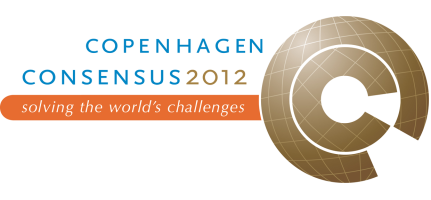Outcome
THE EXPERT PANEL FINDINGS
The third Copenhagen Consensus was a year-long project involving more than 65 researchers tasked with setting priorities among a series of proposals to confront ten great global challenges. A panel of economic experts, comprising some of the world’s most distinguished economists, was invited to consider these issues.
The ten Assessment Papers, commissioned from acknowledged authorities in each area of policy, included nearly 40 proposals for the panel’s consideration. During the conference the panel examined these proposals in detail. Each Assessment Paper was discussed at length with its principal author, and the experts met in private session in Copenhagen. Based on the costs and benefits of the solutions, the panel ranked the proposals in descending order of desirability.
Fighting malnourishment should be the top priority for policy-makers and philanthropists
The Expert Panel was presented with nearly 40 investment proposals designed by experts to reduce the challenges of Armed Conflict, Biodiversity Destruction, Chronic Disease, Climate Change, Education Shortages, Hunger and Malnutrition, Infectious Disease, Natural Disasters, Population Growth, and Water and Sanitation Shortages. They found that fighting malnourishment should be the top priority for policy-makers and philanthropists.
Given the budget constraints, they found 16 investments worthy of investment (in descending order of desirability):
-
Bundled micronutrient interventions to fight hunger and improve education
-
Deworming of Schoolchildren, to improve educational and health outcomes
-
Investing in Effective Early Warning Systems to protect populations against natural disaster
-
Geo‐Engineering R&D into the feasibility of solar radiation management
-
Extended Field Trial of Information Campaigns on the Benefits From Schooling
A complete overview of Copenhagen Consensus 2012's outcomes, as well as the official press release can be downloaded below.
The Expert Panel recommendations were released on 14 May, 2012
- Download the Press Release
- Download the Outcome Document
Nobel Laureate Finn Kydland's recommendations
Research & Development
Research and development to enhance agricultural output has the beauty of helping with three of humanity's challenges. It will reduce hunger by lowering food prices. It will preserve biodiversity. And it will keep carbon locked up in forests, aiding the fight against climate change.
Family Planning
We know more now than we have in the past about how to respond to population pressures and help nations to grow sustainably. If we can meet the need for family planning that exists in some low-income countries, we can create some benefits, including a reduction in infant and maternal mortality. It will also help with other challenges, including climate change and stimulate economic growth.

Nobel Laureate Thomas Schelling's recommendations
Education
Remarkable progress has been made in education. Not long ago, we were mainly concerned with getting children into school. Today, with almost 90% of children in school, we can direct our attention to increasing the quality of schooling.
Infectious disease
The investments to combat infectious disease are very cheap and effective, even using conservative assumptions. Policy-makers can achieve a great amount in this area.

Nobel Laureate Vernon Smith's recommendations
Hunger & Malnutrition
As in 2008, one of the most compelling investments is to get nutrients to the world's undernourished. The benefits from doing so - in terms of increased health, schooling, and productivity - are tremendous.
Infectious disease
Exapanding immunization coverage for children is a very cost-effective intervention that has the potential to save thousands of children's lives.

Panel Member Nancy Stokey's recommendations
Hunger
There are still about 925 million hungry people in the world, and nearly 180 million preschool-age children do not get vital nutrients. A small investment in changing behaviors, delivering micronutrients, and fighting words and diarrheal disease can make a very big difference.
Malaria Combination Treatment:
Helping make malaria combination treatment more affordable for poor countries is an effective and proven solution. I urge policy-makers to prioritize making malaria combination treatment affordable, especially given that resistance is increasing.
Nobel Laureate Robert Mundell's recommendations
Malnutrition
There are compelling reasons for more attention to be devoted to resolving the challenge of malnutrition. This is an area where we have cheap and effective ways to make sustainable changes that can transform lives.
Deworming
Deworming continues to be an overlooked intervention that is deserving of greater attention and resources. This simple and cheap investment can mean a child is healthier and spends more time in school.


